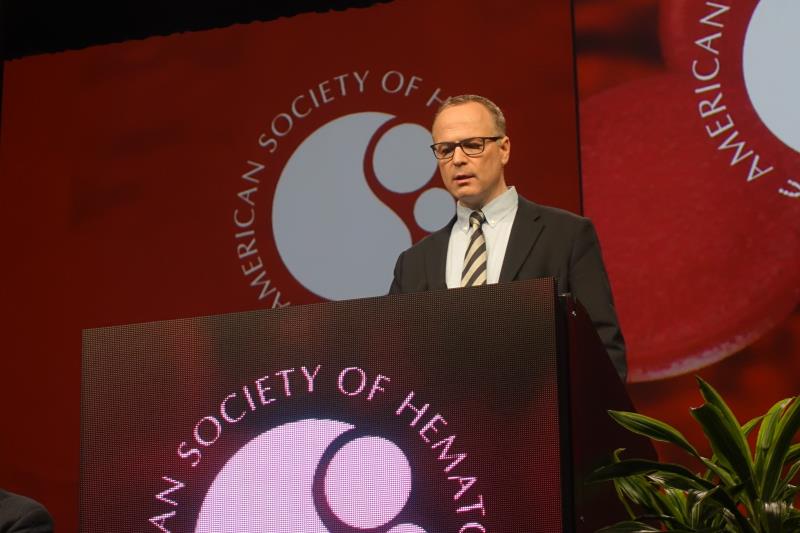 Dr Alexander Roeth
Dr Alexander RoethSutimlimab, a first-in-class selective inhibitor of the classical complement pathway (CP), yields rapid and sustained efficacy in patients with cold agglutinin disease (CAD), a rare autoimmune haemolytic anaemia currently with no approved treatment, according to the Cardinal* study presented at ASH 2019.
“Patients with CAD have an increased early mortality and risk of thromboembolism,” said lead investigator Dr Alexander Roeth of West German Cancer Center at University of Duisburg-Essen in Essen, Germany.
Treatment with sutimlimab prevented haemolysis, significantly increased haemoglobin (Hb), and improved quality of life (QoL) as indicated by the FACIT-F** score.
“These results demonstrate that targeting the CP represents a novel, effective therapeutic approach for the management of CAD and indicate that sutimlimab has the potential to change treatment practices for patients with this condition,” said Roeth.
Hb, haemolysis, QoL: All positive
The pivotal phase III, open-label, single-arm, multicentre study involved 24 patients (mean age 71 years, 62.5 percent female) with CAD and a recent history of transfusion. Patients received intravenous sutimlimab based on body weight: 6.5 g for those <75 kg or 7.5 g for those ≥75 kg; administered on days 0, 7, and biweekly thereafter for 26 weeks. [ASH 2019, abstract LBA2]
“Hb improved rapidly after the first dose of sutimlimab, with 1.2 g/dL increase from baseline by week 1 and 2.3 g/dL increase by week 3,” Roeth reported. Stable Hb levels were sustained at >11 g/dL after week 3 while patients remained on sutimlimab throughout the study.
Increase in mean Hb levels was significant, by 2.6 g/dL during the 26-week period, with 83.3 percent of patients having ≥1 g/dL Hb increase.
Similarly, there was also rapid and sustained control of haemolysis, as indicated by rapid normalization of mean total bilirubin within 1–3 weeks, ie, after 1–2 doses of sutimlimab. Subsequently, bilirubin was maintained below the upper limit of normal throughout the study.
“Rapid inhibition of haemolysis correlated with increases in Hb,” Roeth pointed out. “As haemolysis in CAD is predominantly extravascular, bilirubin is its most accurate biomarker.”
Furthermore, QoL reflected on the FACIT-F score showed improvement by 7 points within the first week. The improvement reached a peak by week 5, amounting to an 11-point increase from baseline at the treatment assessment time point, which according to Roeth, was consistent with a clinically meaningful response. Again, the improvement in QoL was sustained through week 26.
Thirteen patients (54.2 percent) met the prespecified primary endpoint, which was response rate based on a composite of Hb increase (≥2 g/dL from baseline or normalization to ≥12 g/dL), absence of transfusion from weeks 5–26, and no use of CAD medication that was prohibited by the protocol. Seventeen patients (70.8 percent) remained transfusion-free from weeks 5 to 26.
In terms of safety, serious infections were reported but no patient discontinued due to infection and there were no meningococcal infections. Also, there were no serious adverse events suggestive of potential hypersensitivity reactions that were considered related to sutimlimab treatment and no patients developed systemic lupus erythematosus. In addition, no thromboembolic events were reported.
The complement pathway
“Sutimlimab is a first-in-class humanized monoclonal anti-C1s antibody that selectively inhibits the C1 complex of complement, preventing CP activation, while leaving the alternative and lectin pathways intact,” explained Roeth.
“Inhibition of the classical CP activity correlated with improvements in Hb, bilirubin, and FACIT-F,” he added, noting that the classical CP activity was almost completely inhibited by week 1 and that complement C4 rapidly normalized after sutimlimab administration.
All 22 patients who completed the study continued to be followed up in the ongoing extension phase, said Roeth.